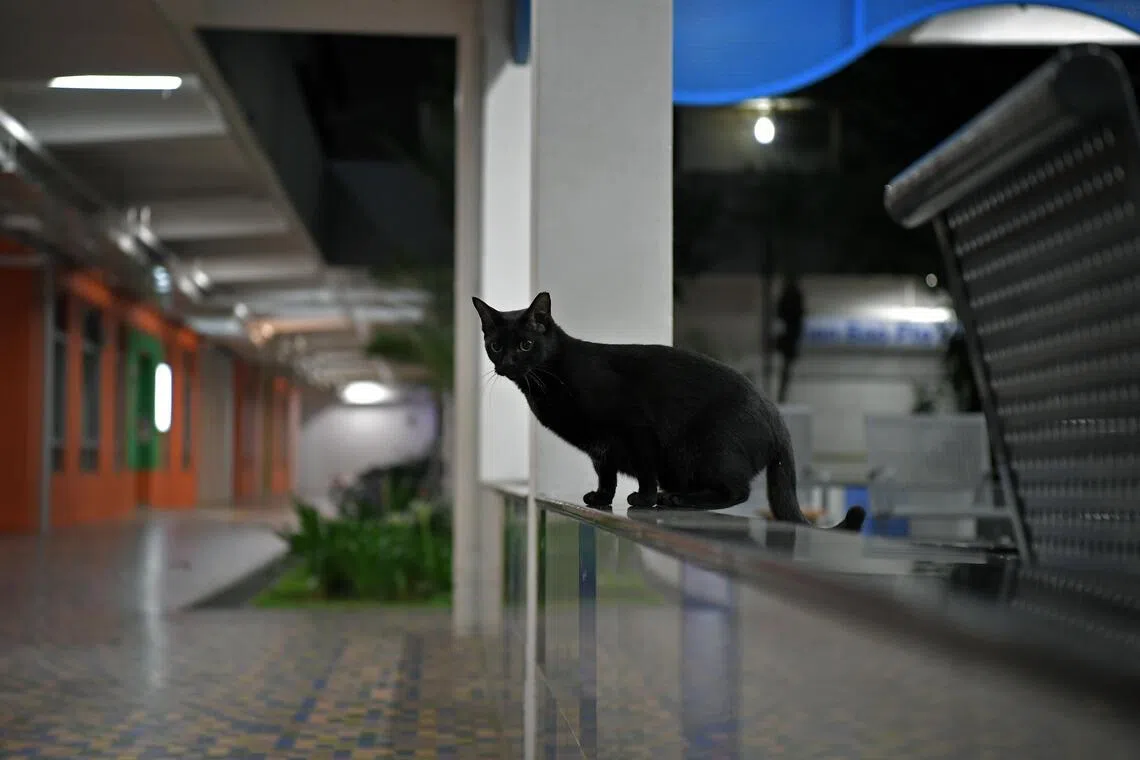61 cases of cats and dogs allegedly falling from height from Sept 1, 2024 to Aug 31: NParks
Sign up now: Get ST's newsletters delivered to your inbox

The cases involved both pet animals and community cats.
PHOTO: ST FILE
Follow topic:
SINGAPORE – A total of 61 incidents involving cats and dogs allegedly falling from heights were reported between Sept 1, 2024 and Aug 31, 2025, the National Parks Board (NParks) said on Oct 15.
Of these cases, 55 involved cats, while the rest involved dogs. “All these 61 cases, especially if it involves pet cats, could have been prevented,” said NParks group director Jessica Kwok.
She was giving an update on the number of cases of animals falling from a height, following new rules implemented on pet owners from Sept 1, 2024.
These rules, set out under the Animals and Birds (Licensing and Control of Cats and Dogs) Rules 2024, require pet owners to take reasonable steps to protect their cat or dog by preventing the animal from being in any place which exposes it to the risk of falling from a height, whether within the residence or elsewhere.
The 61 cases recorded over the past year involved both pet animals and community cats, NParks said.
Community cats are particularly vulnerable, as they live in the open and roam freely, it added.
Among the 61 cases, 29 of them did not flout the Animals and Birds Act (Licensing and Control of Cats and Dogs) Rules 2024.
These cases involved either community animals which are not covered by the new rules, cats or dogs whose cause of death or injury was likely not due to a fall from height, and cats or dogs whose ownership could not be established due to insufficient information.
For the remaining cases, NParks investigated and found that 21 cases involved pets – 19 cats and two dogs – that fell from heights, and took action against these pet owners. The remaining 11 cases are being investigated.
“We looked at these 21 cases and we found that in all cases, it was never a case where an owner intentionally wanted their pet cat or dog to fall; this is different from animal cruelty cases,” said Ms Kwok.
“Very often, owners didn’t think it would happen or didn’t expect it to happen; therefore, it is very important for owners to be aware of the high-rise syndrome, especially for cats.”
High-rise syndrome is used to describe incidents in which pets fall from height and can result in serious injuries such as broken bones and internal injuries.
Depending on the cases, actions taken against the owners may include issuing advisories, warning letters, fines or prosecution. So far, no owner has been prosecuted or issued composition fines.
For example, an injured pet cat was found at a void deck in Yishun in April 2025 and later died from its injuries.
NParks found that the cat had likely fallen from a residential unit on the seventh storey from unmeshed kitchen windows, although the cat owner had installed mesh on some of the windows in the living room.
The owner was issued a warning letter.
In June 2025, a pet dog was found dead at the ground level of an apartment block in Marine Parade. NParks found that the dog had likely fallen from a third-floor unit, where its owner had left it alone with the living room window open.
It was concluded that the dog had likely stepped onto a sofa next to the open window and fell. The owner was also issued a warning letter.
For these high-rise syndrome incidents, many pets do not survive, said Singapore Veterinary Association president Teo Boon Han.
“The injuries can be catastrophic and visually shocking. While cats have a righting reflex that allows them to twist midair and land on their feet, the impact from a fall can still cause severe or fatal injuries,” he said.
He also corrected a misconception that cats can safely survive a fall. “While cats can right themselves, that doesn’t mean they are unharmed – the forces involved in a multi-storey fall can cause massive trauma and lifelong injuries,” he said.
Dogs are also at risk of falling from height if they are kept in premises that are not properly secured.
While falls among dogs are less common, they are usually more catastrophic, as dogs are heavier, less agile and do not have the same ability to reorient their bodies during a fall, compared with cats, said Dr Teo, who is also a veterinarian and pet nutritionist at Canopy Veterinary Centre.
In September, a husky was found to be confined to a service balcony of a 35th-storey HDB unit in Toa Payoh in September and was taken under NParks’ care over unsafe housing conditions and concerns. Investigations are ongoing.
“Neighbours and the public all play an important part, as they are eyes and ears; so when they spot something like that, they should report to us immediately so that we can intervene,” said NParks’ Ms Kwok.
Members of the public can also report suspected animal welfare-related cases, including animals falling from heights, to NParks.
In January, a report by the Society for the Prevention of Cruelty to Animals highlighted 134 cases of high-rise syndrome in 2024, involving 141 animals.
Many of these cases could be easily prevented by securing the entryways to a home, such as by installing grilles with closely spaced gaps and/or fully meshing any windows and gates, it had said.
Correction note: This story has been edited for clarity.


